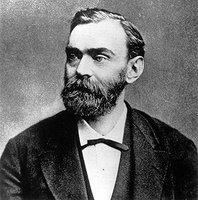Nobel, Alfred Bernhard

The growing understanding of gases and the reactions that produce them was of great importance to modern industrial society. Not least was the production of explosives—substances that undergo reactions involving the release of heat and rapidly expanding gaseous products. In making black powder Antoine-Laurent Lavoisier and E. I. du Pont were improving a technology known to Western cultures since the 14th century and even earlier in China and the Far East. In the 19th century much more powerful explosives were created by treating various organic substances with nitric acid. Among these new explosives was dynamite, a stabilized form of nitroglycerin, invented in 1867 by Alfred Nobel (1833–1896). One thousand times more powerful than black powder, it expedited the building of roads, tunnels, canals, and other construction projects worldwide.
Nobel's father, Immanuel, was a Swedish inventor-entrepreneur in St. Petersburg, who supplied the Russian military with war matériel, including early underwater mines. Alfred and his brothers were educated at home by Swedish and Russian tutors in chemistry and other subjects. Alfred became very proficient in chemistry but also entertained ambitions of becoming a writer. Partly to dissuade him from the latter, his father financed his 16-year-old son's travel and study in Europe, including a stay of some months in the Paris laboratory of Théophile Pelouze, where Nobel shared workspace with an Italian chemist, Ascanio Sobrero, who had first prepared nitroglycerin in 1846. When Alfred was 17, he apprenticed in New York with the Swedish-American inventor John Ericsson, who later built the Monitor, the Union's ironclad warship that became famous for defeating the Confederacy's Merrimac. When Alfred returned to St. Petersburg, the Nobel factory was booming thanks to the Crimean War. When the war ended and the firm went into bankruptcy, Alfred and his father turned to developing methods to produce nitroglycerin in quantity. In 1862 Alfred began its manufacture in a small plant outside Stockholm—a venture that cost the life of his youngest brother, Emil. Alfred persevered, first inventing the blasting cap and then discovering that a silicaceous earth, kieselguhr, would stabilize nitroglycerin, thus making dynamite.
Alfred became wealthy by setting up companies and selling patent rights to dynamite and related products worldwide. The DuPont Company in the United States became one of the chief companies associated with Nobel. In 1875 Nobel created blasting gelatin, a colloidal suspension of nitrocellulose in glycerin, and in 1887 ballistite, a nearly smokeless powder especially suitable for propelling military projectiles. Nobel, the man who had tried to make handling explosives safe for workmen, was deeply troubled by the destructiveness of his inventions and became concerned with establishing worldwide peace.
Nobel died in 1896, leaving his considerable estate as an endowment for annual awards in chemistry, physics, medicine or physiology, literature, and peace—all of which represented his lifelong interests.
Futher Reading